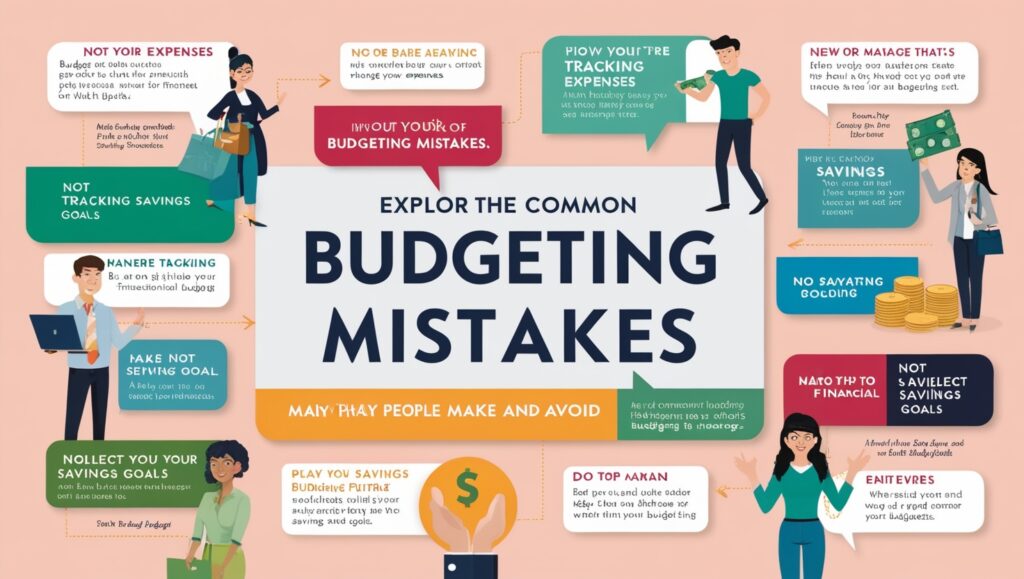Common Budgeting Mistakes and How to Avoid Them
Budgeting is a critical part of managing your finances effectively, but even the most well-intentioned budgeters can slip up. Whether you’re just starting your budgeting journey or have been tracking your finances for a while, it’s easy to make mistakes that can hinder your financial success. Common Budgeting Mistakes and How to Avoid Them Here are some common budgeting mistakes and actionable tips on how to avoid them.
1. Not Setting Realistic Goals
One of the most common mistakes people make is setting unrealistic goals. While it’s great to aim for big financial milestones, like paying off debt or saving for a house, you need to ensure that these goals are achievable within your current financial reality.
How to Avoid It:
When setting goals, break them down into smaller, more manageable targets. For example, instead of focusing on saving $10,000 in six months, aim to save $500 per month. Small, consistent steps will help you stay on track without feeling overwhelmed.
2. Ignoring Small Expenses
It’s easy to overlook small, frequent purchases—like your daily coffee or impulse buys at the store. Common Budgeting Mistakes and How to Avoid Them While these may not seem significant individually, they can add up over time and derail your budget.
How to Avoid It:
Track every expense, no matter how small. Use an expense tracker app or a simple spreadsheet to monitor your spending. Being mindful of every purchase helps you identify where your money is going and can lead to better financial decisions.
3. Failing to Account for Irregular Expenses
Many people forget to account for irregular expenses such as insurance payments, car maintenance, or holiday shopping. These expenses may only happen a few times a year but can be a significant drain on your budget when they arise unexpectedly.
How to Avoid It:
Create a “sinking fund” for irregular expenses. For example, if your car insurance is due every six months, divide the total cost by six months and set aside that amount every month. Common Budgeting Mistakes and How to Avoid Them This way, when the payment is due, you’ll have the funds ready without disrupting your regular budget.
4. Not Tracking or Reviewing Your Budget Regularly
Setting up a budget and then not reviewing it is a common mistake. Life changes, and so do your financial circumstances. Common Budgeting Mistakes and How to Avoid Them If you’re not regularly tracking your spending and adjusting your budget accordingly, you might end up overspending or missing opportunities to save.
How to Avoid It:
Review your budget weekly or at least monthly. Look for areas where you can cut back or reallocate funds, and ensure you’re sticking to your goals. Regular reviews help you stay on top of your finances and keep your budget aligned with your current lifestyle.
5. Not Accounting for Emergency Expenses
Emergencies—whether it’s a medical bill, home repair, or job loss—are a part of life. Yet, many people fail to include these potential costs in their budgets, which can leave them financially vulnerable when an emergency strikes.
How to Avoid It:
Build an emergency fund that covers at least 3–6 months of living expenses. Having this cushion will provide peace of mind and ensure you don’t have to go into debt when unexpected costs arise.
6. Being Too Restrictive
Some budgeters go to the extreme by restricting their spending so much that they don’t enjoy their money or life. This leads to burnout and can make it harder to stick to the budget long term.
How to Avoid It:
Allow yourself some flexibility in your budget. Allocate a portion for leisure activities or discretionary spending. Having a balance between saving and spending helps you stay motivated and makes budgeting feel less like a punishment.
7. Not Including Savings in Your Budget
Many people overlook savings in their budgets, thinking that they’ll save whatever is left at the end of the month. However, this often means there’s nothing left to save once all the bills and expenses are accounted for.
How to Avoid It:
Make savings a priority by paying yourself first. Set aside a percentage of your income for savings as soon as you receive it, before you pay any bills or make any purchases. Treat it like any other bill to ensure that you’re consistently building your savings.
8. Not Adjusting for Lifestyle Changes
Life changes—whether it’s a new job, a move to a new city, or a growing family—often require adjustments to your budget. Failing to update your budget after significant life changes can lead to unnecessary stress and financial strain.
How to Avoid It:
Whenever your life circumstances change, take the time to revisit and revise your budget. Factor in new income sources, changes in expenses, or any other adjustments that affect your finances. Keeping your budget up-to-date will ensure that it remains relevant to your current situation.
9. Neglecting Debt Repayment
Debt can easily become a significant barrier to achieving your financial goals if you neglect it. Focusing solely on saving or other financial goals without addressing your debt can keep you in a cycle of financial stress.
How to Avoid It:
Include debt repayment as a priority in your budget. Whether you’re using the avalanche method (paying off high-interest debt first) or the snowball method (paying off the smallest debts first), make sure you consistently allocate funds toward paying down debt. This will help you reduce financial strain and free up money for savings or investments in the future.
Final Thoughts
Budgeting is an ongoing process that requires attention, flexibility, and regular adjustments. By avoiding these common budgeting mistakes and applying the right strategies, you can take control of your finances and make smarter financial decisions. Remember that the key to successful budgeting is consistency and the willingness to adapt as your life changes. With a little effort and awareness, you can achieve your financial goals and build a more secure future.

